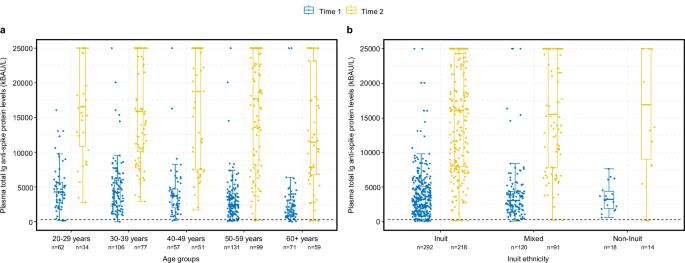Robust immune response to COVID-19 vaccination in the island population of Greenland
IF 5.4
Q1 MEDICINE, RESEARCH & EXPERIMENTAL
引用次数: 0
Abstract
In Greenland, the COVID-19 pandemic was characterised by a late onset of community transmission and a low impact on the healthcare system, hypothesised as being partly due to a high uptake of vaccinations. To underpin this description, we aimed to assess the SARS-CoV-2 immune response post-vaccination in a Greenlandic population. In this observational cohort study, we included 430 adults in Greenland who had received a complete two-dose SARS-CoV-2 vaccination at enrolment. The total plasma SARS-CoV-2 spike glycoprotein Ig antibodies (S-Ab) induced by either the BNT162b2 or mRNA-1273 vaccine, was measured up to 11 months after the second vaccine dose. In addition, total salivary S-Abs were examined in 107 participants, and the T-cell response to the spike glycoprotein was assessed in 78 participants out of the entire study cohort. Here we demonstrate that two months after the second vaccine dose, 96% of participants have protective plasma S-Ab levels. By 11 months, 98% have protective levels, with prior SARS-CoV-2 infection particularly enhancing S-Ab levels by 37% (95% CI 25–51%). Among individuals aged 60 years and older, we observe a 21% (95% CI 7–33%) reduction in antibody response. Total salivary S-Ab levels are detectable in all participants and significantly correlate with plasma levels. Moreover, all participants exhibit a robust SARS-CoV-2-specific T-cell response 11 months post-primary vaccination. Our findings show that Greenlanders exhibit a robust and lasting immune response, both humoral and cellular, comparable to other population groups up to at least 11 months after the second vaccine dose. These results corroborate the hypothesis that vaccines contributed to the mild impact of the COVID-19 pandemic in the Greenlandic population. Effective public health measures were crucial to protect Greenland’s vulnerable population against the COVID-19 pandemic. Vaccines were particularly important, although their effectiveness in Greenland’s unique and isolated population had not been explored. Our aim was to determine the COVID-19 vaccines’ immunological response as a measure of protection among Greenlanders. By measuring antibody levels and immune cell activity, we demonstrate that over nine out of ten Greenlanders remained well protected by COVID-19 vaccines up to 11 months after their second vaccine dose, although older adults were less well protected. Prior COVID-19 infection or a booster dose enhanced protection against severe disease. These findings provide valuable insights for Greenland and similar ancestral and geographical populations, aiding in their ongoing vaccination strategies and future pandemic preparedness. Møller et al. examine reasoning behind the mild impact of COVID-19 on the population of Greenland by measuring immune factors in this highly vaccinated population. Both humoral and cellular immune responses remained high at least 11 months after vaccination in a vast majority of study participants.

格陵兰岛居民对接种 COVID-19 疫苗产生的强大免疫反应。
背景:在格陵兰,COVID-19 大流行的特点是社区传播开始较晚,对医疗保健系统的影响较小,据推测部分原因是疫苗接种率较高。为了证实这一说法,我们旨在评估格陵兰岛居民接种疫苗后对 SARS-CoV-2 的免疫反应:在这项观察性队列研究中,我们纳入了格陵兰岛的 430 名成年人,他们在入组时接种了完整的两剂 SARS-CoV-2 疫苗。在接种第二剂疫苗后的 11 个月内,我们测量了 BNT162b2 或 mRNA-1273 疫苗诱导的血浆 SARS-CoV-2 穗状糖蛋白 Ig 抗体(S-Ab)总量。此外,还检测了 107 名参与者的唾液 S-Abs 总量,并评估了整个研究队列中 78 名参与者对尖峰糖蛋白的 T 细胞反应:结果:我们在此证明,在接种第二剂疫苗两个月后,96%的参与者的血浆S-抗体水平具有保护性。到 11 个月时,98% 的参与者的血浆 S-Ab 含量达到保护性水平,而之前感染过 SARS-CoV-2 的参与者的血浆 S-Ab 含量可提高 37% (95% CI 25-51%)。在 60 岁及以上的人群中,我们观察到抗体反应降低了 21%(95% CI 7-33%)。所有参与者的唾液 S-Ab 总水平均可检测到,并与血浆水平显著相关。此外,在接种初级疫苗 11 个月后,所有参与者都表现出强烈的 SARS-CoV-2 特异性 T 细胞反应:我们的研究结果表明,格陵兰人在接种第二剂疫苗后至少 11 个月内都表现出强大而持久的免疫反应,包括体液免疫和细胞免疫,与其他人群不相上下。这些结果证实了这样一个假设,即格陵兰人在 COVID-19 大流行中受到的影响较轻,疫苗起到了一定的作用。
本文章由计算机程序翻译,如有差异,请以英文原文为准。
求助全文
约1分钟内获得全文
求助全文

 求助内容:
求助内容: 应助结果提醒方式:
应助结果提醒方式:


